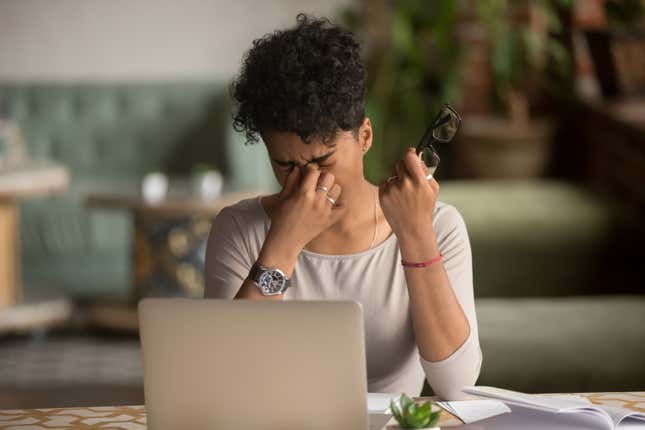
Just about everyone gets a case of the Monday morning blues when they have to go to work after a nice, relaxing weekend. But for some Black women, their office environment can create blues that last all week and seriously impact their mental and physical health. A 2020 Essence study revealed that 45 percent of Black women say the place they experience racism most frequently is in the workplace. Long-term stress at work can lead to issues such as depression, high blood pressure, and heart problems.
Despite all of the challenges, the COVID-19 pandemic provided some stress relief for women who could do their jobs from home while many offices remained closed. The flexibility afforded them freedom from everything from microaggressions to overt discrimination they frequently experienced in the office environment. Rather than having to explain their haircare ritual or answer some ridiculous question on behalf of all Black people, they could actually focus on getting their jobs done.
But when it looked like that time at home was coming to an end, many Black workers were not happy about it. According to a July 2021 study by Future Forum, 97 percent of Black office workers had anxiety about returning to their offices full-time when things opened up, compared to 21 percent of whites who looked forward to getting back into the office.
Now a nonprofit wants to help make the workplace a better and more inclusive environment for Black women. Founded as the National Black Women’s Health Project in 1983, the Black Women’s Health Imperative (BWHI) is the oldest nonprofit organization created by Black women to champion the cause of physical, emotional and financial health and wellness for Black women and girls. The group saw a need to mediate between the Black women who felt discriminated against in the office and the employers who didn’t believe that racism was a real problem in the workplace.
As a result, the BWHI created a three-part workplace equity initiative designed to make the office environment more welcoming and help advance the cause of Black women’s health and wellness. The BWHI initiative intends to work with both employers and employees to help improve conditions in the workplace. The first step is placing employees in a corporate equity index to examine how current policies affect their mental health. They will use their findings to provide employers with customized corporate fairness training to help shift workplace culture and address issues of bias. BWHI will also provide an anti-racism wellness toolkit for Black women that gives them tips on setting boundaries at work and using resources that are in place to help them successfully navigate the office environment.
BWHI also wants more Black women in positions of corporate leadership. Right now, there are just two Black women CEOs of Fortune 500 companies, Roz Brewer from Walgreens Boots Alliance and Thasunda Brown Duckett from TIAA. Adding more could lead to more support and inclusion for Black women.
According to Angelica Geter, Chief Strategy Officer of the Black Women’s Health Imperative, it’s up to companies to extend themselves to make sure Black women feel valued and want to continue to do their best work for the company.“What will you do to make sure Black women stay?” she says. “The opportunities are endless: mentorship, sponsorship, stretch assignments, paths to promotion, affinity groups, a safe way to report discrimination and practices to hold transgressors accountable.”

